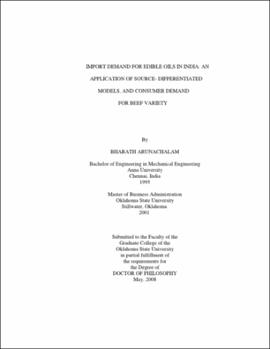| dc.contributor.advisor | Rastegari-Henneberry, Shida | |
| dc.contributor.author | Arunachalam, Bharath | |
| dc.date.accessioned | 2013-11-26T08:21:58Z | |
| dc.date.available | 2013-11-26T08:21:58Z | |
| dc.date.issued | 2008-05 | |
| dc.identifier.uri | https://hdl.handle.net/11244/6503 | |
| dc.description.abstract | Scope and Methods of Study: This study consists of two essays. The purpose of the first essay is to estimate the source differentiated import demand for edible oils in India using different versions of the differential demand model; including the Rotterdam, the almost ideal demand system (AIDS), the Central Bureau of Statistics (CBS), the National Bureau of Research (NBR), and the General specifications. The General Model nests all the other models and is estimated to determine the model that best fits the data. The tests for symmetric weak separability and product aggregation are also conducted. The purpose of the second essay is to determine consumers' willingness to pay for ground beef attributes; including traceability certified by the U.S. Government or by a private company, humane production technique, certified natural beef, and fat content. This study is also intended to determine the impact of an increase in the number of ground beef choices on consumers' utility. The impact of personal characteristics on the effect of number of choices on consumers' utility is also considered. A nationwide survey was conducted to elicit consumers' preferences. | |
| dc.description.abstract | Findings and Conclusions: The results from the first study show that the General Model best fits the Indian edible oil import data. The tests for weak separability and product aggregation support the estimation of source differentiated models including all three edible oil types (palm oils, soybean oils, and other oils). The results also indicate that soybean oils have larger own-price (in absolute values) elasticities than palm oils, and Malaysia and the U.S. have the largest expenditure elasticities in the palm and soybean oil import markets, respectively. The results from the second study show that consumers are willing to pay more for traceability certified by the U.S. Government than any other ground beef attribute considered in this study. Furthermore, an increase in the number of ground beef choices beyond a threshold level has a negative impact on consumers' utility and that impact depends on consumers' individual characteristics. | |
| dc.format | application/pdf | |
| dc.language | en_US | |
| dc.rights | Copyright is held by the author who has granted the Oklahoma State University Library the non-exclusive right to share this material in its institutional repository. Contact Digital Library Services at lib-dls@okstate.edu or 405-744-9161 for the permission policy on the use, reproduction or distribution of this material. | |
| dc.title | Import demand for edible oils in India: An application of source-differentiated models, and consumer demand for beef variety | |
| dc.contributor.committeeMember | Brorsen, B. Wade | |
| dc.contributor.committeeMember | Epplin, Francis M. | |
| dc.contributor.committeeMember | Norwood, F. Bailey | |
| dc.contributor.committeeMember | Warde, William D. | |
| osu.filename | Arunachalam_okstate_0664D_2674.pds | |
| osu.accesstype | Open Access | |
| dc.type.genre | Dissertation | |
| dc.type.material | Text | |
| dc.subject.keywords | differential demand models | |
| dc.subject.keywords | import demand for edible oils in india | |
| dc.subject.keywords | barten's model selection method | |
| dc.subject.keywords | willingness- | |
| thesis.degree.discipline | Agricultural Economics | |
| thesis.degree.grantor | Oklahoma State University | |
